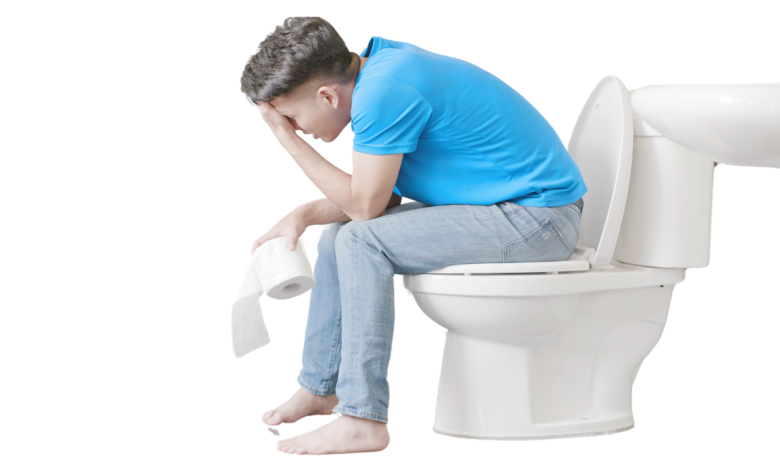Constipation: A Comprehensive Guide
Constipation Solutions: A Detailed Guide to Digestive Health

Question: What is constipation and how is it defined medically?
What is Constipation?
- Infrequent Bowel Movements: Having bowel movements less often than what is normal for you. This often means fewer than three bowel movements per week.
- Difficulty Passing Stools: Stools may be hard, dry, and difficult or painful to pass.
- Other Symptoms: May include straining during bowel movements, feeling like you haven’t completely emptied your bowels, and abdominal discomfort.
How is it Defined Medically?
While everyone’s bowel habits are different, doctors generally define constipation based on the following criteria:
- Fewer than three bowel movements per week.
- At least one of the following symptoms present for at least 3 months:
- Straining during at least 25% of bowel movements
- Lumpy or hard stools at least 25% of the time
- Feeling of incomplete evacuation at least 25% of the time
- Feeling of blockage in the rectum at least 25% of the time
- Needing manual maneuvers to facilitate bowel movements at least 25% of the timeQ
Question: How common is constipation and who is most at risk?
- High Prevalence: Constipation is a very common health complaint, affecting a significant portion of the population worldwide.
- Global Impact: Studies estimate that around 14% of adults globally experience chronic constipation.
- United States: In the United States, approximately 33 million adults experience constipation, leading to millions of doctor visits and hospitalizations each year.
Who is Most at Risk?
- Older Adults: As people age, their digestive system slows down, making them more prone to constipation.
- Women: Hormonal fluctuations and pregnancy can increase the risk of constipation in women.
- Pregnant Individuals: Hormonal changes and pressure from the growing uterus can contribute to constipation during pregnancy.
- People with Low-Fiber Diets: Inadequate fiber intake can lead to harder stools and difficulty passing them.
- Individuals Taking Certain Medications: Some medications, such as opioids, antacids, and antidepressants, can cause constipation as a side effect.
- People with Certain Medical Conditions: Conditions like hypothyroidism, diabetes, irritable bowel syndrome (IBS), and neurological disorders can increase the risk of constipation.
- Individuals with Sedentary Lifestyles: Lack of physical activity can slow down digestion and contribute to constipation.
- People Who Ignore the Urge to Defecate: Regularly ignoring the urge to have a bowel movement can weaken the signals and lead to constipation.
Question: What are the potential complications of chronic constipation?
Common Complications:
- Hemorrhoids: Swollen veins in the anus and rectum, often caused by straining during bowel movements.
- Anal Fissures: Small tears in the lining of the anus, which can cause pain and bleeding.
- Fecal Impaction: A large mass of dry, hard stool that becomes stuck in the rectum and cannot be passed easily.
Less Common but Serious Complications:
- Rectal Prolapse: A condition where the rectum protrudes through the anus due to weakened supporting tissues.
- Megacolon: A condition where the colon becomes abnormally enlarged, potentially leading to severe complications.
Other Potential Issues:
- Urinary Problems: Chronic constipation can sometimes put pressure on the urinary tract, leading to issues like urinary frequency or urgency.
- Psychological Impact: The discomfort and frustration associated with chronic constipation can affect quality of life and contribute to anxiety or depression.
Question: What are the most common causes of constipation?
- Low Fiber Intake: Fiber adds bulk to the stool, helping it move through the digestive tract. A diet lacking in fiber-rich foods like fruits, vegetables, and whole grains can lead to constipation.
- Dehydration: Not drinking enough fluids can cause stools to become hard and dry, making them difficult to pass.
Lifestyle Factors:
- Lack of Physical Activity: Exercise helps stimulate bowel movements. A sedentary lifestyle can contribute to constipation.
- Ignoring the Urge to Defecate: Regularly ignoring the urge to have a bowel movement can weaken the signals and lead to constipation.
Medications:
- Certain Medications: Some medications, such as opioids (pain relievers), antacids containing aluminum or calcium, antidepressants, iron supplements, and some blood pressure medications, can cause constipation as a side effect.
Medical Conditions:
- Certain Medical Conditions: Several medical conditions can contribute to constipation, including:
- Hypothyroidism (underactive thyroid)
- Diabetes
- Irritable bowel syndrome (IBS)
- Neurological disorders (such as Parkinson’s disease or multiple sclerosis)
- Structural problems in the digestive tract .
Question: How do diet and lifestyle contribute to constipation?
- Low Fiber Intake:
- Fiber is the indigestible part of plant foods that adds bulk to the stool and helps it move through the digestive tract.
- A diet lacking in fiber can result in small, hard stools that are difficult to pass.
- Good sources of fiber include fruits, vegetables, whole grains, and legumes.
- Dehydration:
- Water helps to soften stool and makes it easier to pass.
- Not drinking enough fluids can lead to hard, dry stools that are more difficult to eliminate.
- High Intake of Processed Foods:
- Processed foods are often low in fiber and high in fat, which can slow down digestion and contribute to constipation.
Lifestyle Factors:
- Lack of Physical Activity:
- Exercise helps stimulate bowel movements and promotes regular digestion.
- A sedentary lifestyle can slow down digestion and increase the risk of constipation.
- Ignoring the Urge to Defecate:
- Regularly ignoring the urge to have a bowel movement can weaken the nerve signals that control bowel function.
- This can make it more difficult to have a bowel movement later on.
- Changes in Routine:
- Travel, changes in sleep patterns, or changes in meal times can disrupt normal bowel function and lead to constipation.
Question: Can certain medications or medical conditions cause constipation?
Medications that can cause constipation:
- Opioids (Narcotic Pain Relievers): These strong pain medications (like morphine, codeine, oxycodone) slow down muscle contractions in the intestines, making it harder for stool to move through.
- Antacids (Containing Aluminum or Calcium): Some antacids can interfere with bowel function and lead to constipation.
- Antidepressants: Certain types of antidepressants, particularly tricyclic antidepressants, can have anticholinergic effects that slow down digestion.
- Iron Supplements: Iron can be constipating for some people.
- Certain Blood Pressure Medications: Some calcium channel blockers and beta-blockers can contribute to constipation.
- Anticonvulsants: Medications used to treat seizures can sometimes cause constipation.
- Antipsychotics: Some medications used to treat mental health conditions can have constipating effects.
Medical conditions that can cause constipation:
- Hypothyroidism (Underactive Thyroid): An underactive thyroid can slow down many bodily functions, including digestion.
- Diabetes: Nerve damage from diabetes can affect the nerves that control bowel function.
- Irritable Bowel Syndrome (IBS): While IBS can cause both diarrhea and constipation, some people primarily experience constipation (IBS-C).
- Neurological Disorders: Conditions like Parkinson’s disease, multiple sclerosis, and spinal cord injuries can affect the nerves that control bowel movements.
- Structural Problems in the Digestive Tract: Blockages or narrowing in the colon or rectum can make it difficult for stool to pass.
- Celiac Disease: This autoimmune disorder affecting the small intestine can sometimes cause constipation.
Question: What is the role of the gut microbiome in constipation?
The gut microbiome, the complex community of microorganisms living in your digestive tract, plays a significant role in various aspects of health, including digestion and bowel regularity. Here’s how it relates to constipation:
1. Fermentation and Short-Chain Fatty Acids (SCFAs):
- Fiber Breakdown: Gut bacteria ferment dietary fiber, producing SCFAs like butyrate, acetate, and propionate.
- Stimulating Bowel Movements: SCFAs help stimulate bowel contractions (peristalsis), which move stool through the intestines.
- Water Absorption: SCFAs also promote water absorption in the colon, which helps soften stool and make it easier to pass.
2. Gut Motility and Transit Time:
- Influencing Muscle Contractions: The gut microbiome can influence the nerves and muscles that control gut motility (movement).
- Regulating Transit Time: A balanced gut microbiome helps regulate the speed at which food moves through the digestive tract, preventing it from becoming too slow (which can lead to constipation).
3. Gut Microbiome Imbalance (Dysbiosis):
- Changes in Composition: An imbalance in the gut microbiome, known as dysbiosis, can disrupt these processes.
- Reduced SCFA Production: Dysbiosis may lead to reduced production of SCFAs, affecting bowel contractions and stool consistency.
- Altered Gut Motility: Imbalances in gut bacteria can also affect gut motility, potentially slowing down transit time and contributing to constipation.
4. Other Potential Mechanisms:
- Inflammation: Some studies suggest that gut microbiome imbalances may contribute to low-grade inflammation in the gut, which can affect bowel function.
- Gas Production: Changes in the gut microbiome can also lead to increased gas production, which can cause bloating and discomfort, sometimes associated with constipation.
Maintaining a Healthy Gut Microbiome:
- Diet: A diet rich in fiber, fruits, vegetables, and whole grains can help promote a healthy gut microbiome.
- Probiotics and Prebiotics: Probiotics (beneficial bacteria) and prebiotics (foods that feed beneficial bacteria) may help improve gut microbiome balance.
- Lifestyle: Regular physical activity and stress management can also positively influence the gut microbiome.
Question: What are the typical symptoms of constipation?
- Infrequent bowel movements: This is one of the most common signs of constipation. It generally means having fewer than three bowel movements a week.
- Difficulty passing stools: You may experience straining, pain, or a feeling of blockage when trying to have a bowel movement.
- Hard, dry, or lumpy stools: The stool may be difficult to pass and resemble pebbles or small rocks.
- Feeling of incomplete evacuation: This is the sensation that your bowels are not fully emptied after a bowel movement.
- Abdominal discomfort: You may experience bloating, cramping, and pain in your abdomen.
- Other symptoms:
- Loss of appetite
- Nausea
- Headache
- Feeling sluggish or unwell
Question: How is constipation diagnosed?
Typical Symptoms of Constipation:
- Infrequent Bowel Movements: Having fewer than three bowel movements per week is a primary indicator.
- Hard, Dry, or Lumpy Stools: Stools may be difficult to pass and resemble pebbles or small rocks.
- Straining During Bowel Movements: Significant effort and pressure are required to pass stools.
- Feeling of Incomplete Evacuation: The sensation that the bowels are not fully emptied after a bowel movement.
- Feeling of Blockage: A sense of obstruction or blockage in the rectum.
- Abdominal Discomfort: This can include bloating, cramping, and pain in the abdomen.
- Other Symptoms:
- Loss of appetite
- Nausea
How is Constipation Diagnosed?
Diagnosis typically involves:
- Medical History: Your healthcare provider will ask about your bowel habits, diet, medications, and any other relevant medical conditions.
- Physical Examination: This may include a digital rectal exam to assess for any blockages or abnormalities.
- Additional Tests (if necessary): In some cases, further tests may be needed to rule out underlying conditions:
- Blood Tests: To check for conditions like hypothyroidism.
- Stool Tests: To check for infections or other abnormalities.
- Imaging Studies: Such as X-rays or colonoscopy, to visualize the colon and rectum.
- Anorectal Manometry: To assess the function of the muscles in the rectum and anus.
- Colonic Transit Study: To measure how quickly food moves through the colon.
Question: Are there any warning signs that might indicate a more serious underlying condition?
Yes, there are certain warning signs associated with constipation that could indicate a more serious underlying medical condition. It’s crucial to be aware of these red flags and seek prompt medical attention if you experience them.
Here are some warning signs that might indicate a more serious underlying condition:
- Rectal Bleeding: Blood in the stool or bleeding from the rectum can be a sign of various conditions, including hemorrhoids, anal fissures, inflammatory bowel disease, or even colorectal cancer.
- Blood in the Stool: This can appear as bright red blood or dark, tarry stools, and may indicate bleeding in the digestive tract.
- Persistent Abdominal Pain: Severe or persistent abdominal pain that doesn’t improve with usual constipation remedies could be a sign of a blockage or other serious issue.
- Unexplained Weight Loss: Significant weight loss without any intentional dietary changes can be a red flag for various medical conditions, including cancer.
- Changes in Stool Caliber: A noticeable narrowing of the stool (pencil-thin stools) can indicate a blockage or narrowing in the colon.
- New Onset of Constipation in Older Adults: Constipation that develops for the first time in older adults should be evaluated by a healthcare provider to rule out any underlying causes.
- Constipation Alternating with Diarrhea: This pattern can be a sign of irritable bowel syndrome (IBS) or other digestive disorders.
- Inability to Pass Gas: This can indicate a bowel obstruction, a serious condition that requires immediate medical attention.
- Vomiting: Persistent vomiting along with constipation can also be a sign of a bowel obstruction.
- Family History of Colon Cancer or Inflammatory Bowel Disease: If you have a family history of these conditions, you may be at higher risk and should discuss any bowel changes with your healthcare provider.





